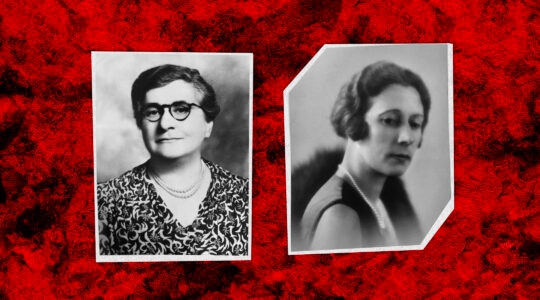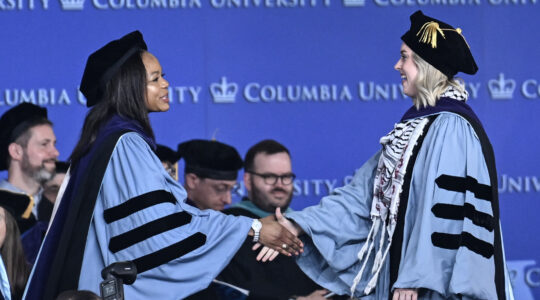While Gary Rosenblatt’s “Claims Conference Facing New Pressures” (July 17) was published as a column and not a news report, one would expect that what Rosenblatt deems “facts” would be accurate. Yet, once again The Jewish Week’s coverage of the Claims Conference is rife with factual errors, and the need for the paper to retain a public editor evident.
Here’s a sampling of Rosenblatt’s egregious errors:
1. The column states: “Berman was cited [in a 2013 report written by Claims Conference ombudsman at the time, Shmuel Hollander] for not acting sufficiently on an anonymous letter to him in 2001 that outlined the details of the fraud” perpetrated on the conference. There are several inaccuracies in this statement, but let’s limit ourselves to two.
First, the anonymous letter was not written to me but to the conference office in Germany. Second, while the Hollander report (which the press obtained more than two years ago) was critical of the conference in its handling of the anonymous letter, it did not state that I — who, at the time the letter was received in 2001 in Germany by the conference and investigated, was pro bono counsel for the conference and not its chairman — did not act sufficiently with regard to the anonymous letter. (In fact, one week before Rosenblatt published his column, the JTA wrote that the report “exonerated Berman.”) Thus, the column’s later reference that the report “criticized Berman” is also inaccurate. A “news” article one week earlier by Rosenblatt (“Retaliation at Claims Conference?” July 10) contains similar inaccurate statements.
2. The Rosenblatt column also states Hollander asserted that “the leadership council [of the conference] fully endorsed his 2013 Report.” Hollander asserted no such thing. That would be impossible since — as the column earlier stated — the “leadership council” did not even exist until 2014.
Further, even the four-member Select Leadership Committee, which tasked Hollander with conducting a fact-finding investigation regarding the anonymous letter, did not “fully endorse” his 2013 report. Two of the four members of that committee (none of whom were involved in the underlying facts related to the report) resigned from the committee, stating, inter alia, that they did not want to be associated with the report and its findings, and that the report contained “material factual errors.” (The above-referenced JTA article also correctly states that two of the four conference committee members “disavowed the report and resigned.”)
In fact, conference executive vice president Gregory Schneider, in a detailed 21-page statement, dated July 7, 2013 (which the press also obtained more than two years ago), demonstrated to the board that the report contained numerous material factual errors. Perhaps that is why not only the four-member Select Leadership Committee, but the board as a whole never adopted the factual findings of Hollander’s report. Accordingly, the column’s next statement that “Berman and Schneider and two other Conference leaders, Roman Kent and Reuven Merhav” “approved” the report is also false.
3. Further, the column states that “in fact Hollander later learned there was no … demand from the Germans [for a letter disavowing the Hollander report].” However, even Hollander does not allege this. Rather, Hollander alleges in his letter to the conference board (which The Jewish Week cited) that “[i]t later became apparent to [him] that the senior official in charge of such matters in the Ministry of Finance was in fact unaware of any such demand on the part of his Ministry.” There is a critical difference between “Hollander alleges that it became apparent to him that an alleged [albeit unidentified] senior German official, which he contends is in charge of such matters in the Ministry of Finance, was unaware of such demand” and “in fact Hollander later learned that there was no such demand from the Germans.”
Why did Rosenblatt not check the facts? Is it possible that the editor and publisher of The Jewish Week failed his basic responsibility to exercise appropriate journalistic standards? Did he read articles written by fellow critics and the media who neglected to check their facts and simply assume the facts to be true? It behooves The Jewish Week to appoint a public editor, who can investigate this matter and answer these questions.
Perhaps if the facts were reported accurately, the column would be less interesting, the criticism less convincing, and Rosenblatt’s repeated appeals for change at the conference would lose their bite. In any event, while Rosenblatt and other long-standing critics of the conference are free to criticize, they are not free to create facts to support their criticism.
In the meantime we at the Claims Conference continue to seek to secure what we consider a small measure of justice for Jewish victims of Nazi persecution.
Julius Berman is president of the Conference on Jewish Material Claims Against Germany.
The New York Jewish Week brings you the stories behind the headlines, keeping you connected to Jewish life in New York. Help sustain the reporting you trust by donating today.




